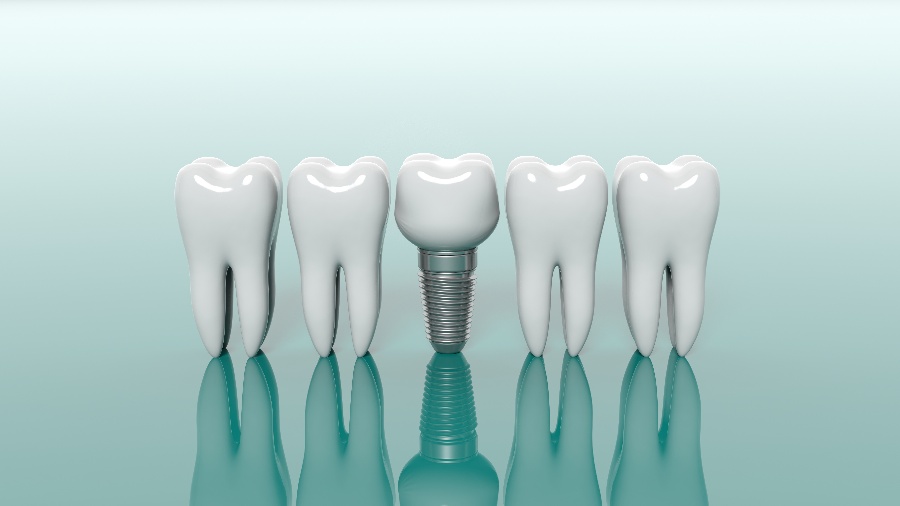If you are considering dental implants, you might have questions about how long it will take to recover. Although your recovery process is unique to you, some general guidelines apply to most people. One major factor you should consider and discuss with your dentist is the many benefits of the time invested in implants.
What To Expect After Dental Implant Surgery
Your dentist will give you specific postoperative instructions on the day of surgery. These will include dietary guidelines and taking any prescribed medications. Following these instructions will help ensure a successful procedure and a shortened recovery time.
Although every implant case is different, your experience can include some of the following after your surgery.
- Grogginess. Sedation dentistry is commonly used to provide the ultimate comfort for implant surgery. You can expect to feel groggy or lethargic once the procedure is completed. Depending on the level of sedation you receive, the grogginess will dissipate over time.
- Numbness. After the grogginess wears off, you may notice that your mouth remains numb. Some local dental anesthetics last for several hours and require caution when eating and drinking during this time.
- Bleeding. Minor bleeding is normal for about twenty-four hours after surgery. Your dentist may have you bite on gauze to promote blood clotting and control bleeding. A small amount of blood mixed with saliva can make the bleeding seem worse than it is. However, if you have concerns about the amount of bleeding, you should contact your dentist immediately.
- Discomfort. Once the sedation and local anesthetic wear off, you may have mild discomfort. This is typically alleviated with over-the-counter pain medications. Your dentist may also prescribe medications that should be taken as directed. (Note: Some prescription medications, such as beta-blockers, blood pressure medications, Coumadin, Plavix, and other blood thinners, should not be taken with Ibuprofen or Aspirin.)
- Swelling. After the first day, you may notice slight swelling and bruising. This usually resolves within two weeks. If it persists or worsens, you may have an infection and should contact your dentist.
Does Dental Implant Surgery Hurt?
Although the internet has helped educate patients about the many benefits of dental implants, it can also cause more anxiety and postoperative pain for some. One study found that patients who learn about implant surgery through watching a video required more analgesics for pain relief.
Watching videos of implant surgery may lead to a faulty conclusion about the nature of normal postoperative discomfort. Many people mistakenly believe their pain is caused by the implant in the jaw bone. However, it is the manipulation of the soft tissue that causes any discomfort. Your gums have many nerve fibers and any encroachment of this tissue, such as a deep cleaning or surgical incision, leads to soreness. Therefore, you can learn a great deal by watching implant videos without them causing anxiety from seeing implants placed within the bone.
The Benefits of Sedation Dentistry for Implant Surgery
Dental implant procedures can cause anxiety and apprehension like most other surgical procedures. Although local dental anesthetics provide profound numbness for the surgery, many patients prefer sedation dentistry to alleviate their anxiety. In addition, sedation dentistry can help you have a:
- Relaxed procedure. Most patients have some anxiety when they arrive for their dental implant surgery. This fear and apprehension are immediately alleviated after the chosen sedation takes effect.
- Forgotten procedure. You can enjoy the many benefits of having implants without remembering the procedure. Some sedation methods use medications that produce an amnesic effect, much like other medical surgeries, so you can enjoy your implant and forget the procedure. This is especially beneficial to extremely anxious or phobic patients.
- Painless procedure. Although dental anesthetics are very effective at controlling pain, they are not perfect. It is not unusual to feel pressure during treatment. However, sedation dentistry can make surgery a painless and comfortable procedure.
- Gag-free procedure. Even though it is a natural defense mechanism, a gag reflex prevents some people from having dental treatment. The use of sedation can alleviate this problem to permit the completion of implant surgery.
- Faster procedure. Sedation benefits the dentist as well as the patient. Dentists work faster and are more satisfied with the surgical results when the patient is sedated and relaxed.
Bone Graft Healing Time
Bone grafting is sometimes needed before implant surgery if sufficient bone density is lacking. There are several reasons you may not have enough bone to support an implant, including the following:
- Severe periodontal disease.
- Trauma to the face or jaws.
- Developmental defects.
- Tooth extractions.
- Years of wearing traditional dentures.
The healing time after a bone graft depends on several factors, such as the size of the defect being treated and your overall health. Once the grafted bone has fused with your existing bone, your implant can be placed.
Factors That Affect Recovery Time
The time it takes to heal after getting dental implants is unique to you and can take up to several months. During this time, the implant is fusing (a process known as osseointegration) with the bone. You will not feel this process occurring, but it is crucial to the long-term success of your treatment.
Several factors determine your recovery time, including the following:
- Lifestyle choices. Smoking and using other tobacco products interfere with and prolong healing and are leading causes of implant failure. There is also evidence that daily alcohol consumption can negatively affect recovery time.
- Oral hygiene. Preventing dental plaque accumulation around the implant is essential to the successful healing of the surgical site. Gum disease around the implant can cause a loosening and possible loss of the implant.
- Number of implants. A single tooth implant will heal faster than implants placed to support complete upper and lower dentures.
- General health. Some chronic diseases, such as diabetes, can slow the healing process and cause more complications.
- Post-operative diet. Eating a diet that promotes healing can significantly improve the recovery time and process. Foods to avoid include hard, crunchy, sticky, and acidic foods that can hinder healing.
Schedule an Appointment
Dental implants can restore your natural smile and allow you to eat the foods you enjoy again. Palmetto Dental Arts provides a comprehensive dental treatment that can include a 3D CAT scan, bone grafting, periodontics, sedation dentistry, and cosmetic dentistry to ensure you get the smile and confidence you want. To learn more, call us or contact us online.






